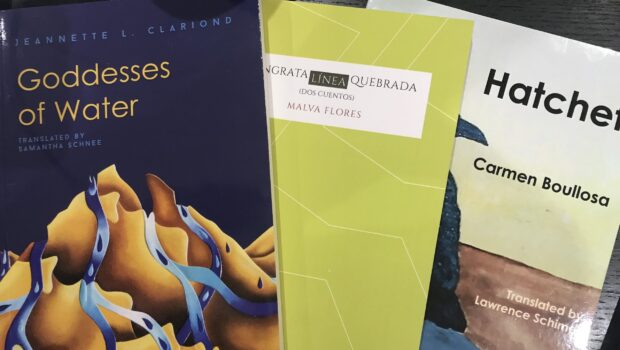Chamber Canon By Tununa Mercado
Greg Walklin
Chamber Canon
By Tununa Mercado
Translated by Rhonda Dahl Buchanan
Literal Publishing
Chamber Canon, Tununa Mercado’s 1988 collection of short stories, vignettes, and meditations, begins with definitions. Now in an English translation by Rhonda Dahl Buchanan, the book defines the Latin-based “canon,” from its musical application (“a fugue of voices”) to its more common usages as a “standard,” or “rule,” or “instructions on how to do something.” “Chamber,” by contrast, is a bit more esoteric. The book notes the roots of the Spanish word, “alcoba” (the Spanish title was Canon de Alcoba ) as coming from Arabic, and adds that chambers are “reserved for sleeping.”
A more direct translation of “alcoba” is “bedroom.” In English, referring to things that happen in “the bedroom” usually has a sexual or intimate connotation; and in Chamber Canon, it’s this type of bedroom desire, in its physical, intimate and existential ways, which animates the many various, enigmatic pieces here. Mercado, who is from Argentina, lived for a long time in Mexico, and so many of the works in Chamber Canon cover areas she is familiar with, from Buenos Aires to the Mexican coast, and even New York City.
Two of the earlier stories in the book may be its most striking. “Anti-Eros” is written as an instruction manual, or perhaps a recipe, for the many home duties of a house servant, but transforms, step-by-step, threading the duties of a servant in the intimate parts of a home with the intimacies of work, self-care, and physicality: “With the same oil used to sauté some of the ingredients now boiling slowly over the flames, anoint the curve of the buttocks, the legs, the calves, the ankles.” The skill of this piece is how deftly, and subtly, Mercado’s words join the ideas and concepts, often before the reader even realizes its happening. (“Begin in the bedrooms,” it starts.) Household duties become a sort of onanistic sacrament, or a performance, and by the end we are left astonished at what has taken place. Is this the sort of thing happening in every palatial home?
“Watching,” one of the pieces that most resembles a typical short story, revels in the physical description of a woman, who comes home every day from work and parades around her New York apartment, nude, with the blinds open. A man has noticed, and regularly adjusts his own schedule so he can watch her from his own apartment window across the street: “He’s suspended in that time and space by his own choice,” Mercado writes, “and partakes of that daily bread not only because it’s his sustenance, but because that simple act of a watching someone who lets herself be watched has become a type of operation whose extractions and additions provide infinite variations…” If at first it seems pornographic or creepy—the story does take place in the section labeled “Mirages”—there eventually comes an O’Henry-esque twist that makes you reconsider everything. This story, like so many other stories in the rest of the volume, masterfully plumb the fickle, complicated, and evanescent subject of desire. What motivates the man, and the woman, is how that desire can continue, stretch out, and last longer than perhaps it otherwise would: “He lived for the moment he could arrive, settle in, and gaze.”
Indeed, the characters in many of these stories are more after the arousal rather than the orgasm. “Listening” involves a woman in one room, who can hear two other women making love. The woman listening imagines all of the sexual details. Although they don’t speak directly of it, the couple seem to know exactly what they are doing, and know that the other woman can hear everything. All participate in this shared intimacy, even if the intimacy is not equal. Here, the idea of compartmentalization—the unspoken nature of a lot of sexual behavior and action, and how people separate themselves from it—is on display.
Similarly, “Eros,” the last section of the book, spends more time on the idea of desire, with multiple essays on various aspects of love, such as “Unscrupulous Love,” “Discursive Love,” “Delirious Love,” and such. “Desire lies in wait,” Mercado writes in “The House of Love,” “ready to emerge at any moment when incited by the slightest provocation.” Rather than stories, though, these pieces are philosophical inquiries—the kind of thing one imagines being interrogated over in a doctoral classroom. This can sometimes be difficult to read, and opaque, and certainly often head-scratching, but there is enough profound thinking in there to reward careful reading. Desire, once stoked, Mercado writes, flourishes not in the light, but in the darkness—in the imagination. “Contrary to all arguments that light fosters love, dimness is what stimulates the pure dimension of touch, the vertigo of smell, gasps and panting in the ear, and the voice swooning at a lack of words.” Real thrill is joined with the imagination, and is the creation of the mind. (One recalls Proust here more than a few times: these kinds of discussions would have been at home in “In Search of Lost Time.”) Desire is the turnkey of love, and once it’s gone, one becomes “…paralyzed by the convergence of consummated desire and the terror of its disappearance…”
Mercado’s keen eye examines many other topics, too, and it’s principally for these reasons that “bedroom” would not be a satisfactory translation of “alcoba”: this would lose some of the other connotations of “chamber,” such “vault,” or “cabinet,” important to the rest of the book. This nuance is a credit to the engaging translation by Buchanan, who obviously understands that Mercado’s work hinges on the meaning of key words.
One “cabinet” piece, “Birds,” in the section entitled “Dreams,” establishes the dreamlike quality to the creatures—how they fly in, fly out, and usually never let you get too close. “Where do they come from, from what forests, mountains or deserts?” Mercado waxes encyclopedic: “[D]oves coo, turkeys hiss, ducks quack, chachalacas chatter, cockatoos speak, hurling curses, partridges whistle in the air fragment with rosemary.” Birds “gather like a colony of pain.” Peacocks howl “as if they were souls in purgatory.” A paired chapter, “Realities,” includes several jarring pieces, such as “Mutants,” a reality-check, as it were, about how people with significant disabilities or disfigurements have been treated. There are also a few short pieces connected to Argentine history, such as the reigns of Perón, and the attorney and politician Rodolfo Ortega Peña, who was assassinated by anticommunists.
Throughout, Mercado’s focus (and indeed, this translation’s) is on the particular words being used. None of the pieces are long—and so obvious, careful attention has been paid to diction, especially challenging given some of deep, conceptual thinking. Many are poetic, and thus demand multiple readings and an intense focus on the abstractions the writing examines. In the final piece, “Fina Point,” Mercado steps back to examine the act of writing itself, which she notes “is like embroidery, needlework is like the text.” And it’s the act of writing, where the truest closeness lies. “If one insists, if patience doesn’t run out, what may be glimpsed on the horizon, as if through a veil or latticework, will have the closest intimacy imaginable, that of the letter.” This is an intimacy not only of others—writing, of course, shares our own thoughts for others to see—but also a better understanding of ourselves.
 Greg Walklin is an attorney and writer living in Lincoln, Nebraska. His book reviews have appeared in The Millions, Necessary Fiction, The Colorado Review, and the Lincoln Journal-Star, among other publications. He has also published several pieces of short fiction. Twitter: @gwalklin
Greg Walklin is an attorney and writer living in Lincoln, Nebraska. His book reviews have appeared in The Millions, Necessary Fiction, The Colorado Review, and the Lincoln Journal-Star, among other publications. He has also published several pieces of short fiction. Twitter: @gwalklin
©Literal Publishing. Queda prohibida la reproducción total o parcial de esta publicación. Toda forma de utilización no autorizada será perseguida con lo establecido en la ley federal del derecho de autor.
Las opiniones expresadas por nuestros colaboradores y columnistas son responsabilidad de sus autores y no reflejan necesariamente los puntos de vista de esta revista ni de sus editores, aunque sí refrendamos y respaldamos su derecho a expresarlas en toda su pluralidad. / Our contributors and columnists are solely responsible for the opinions expressed here, which do not necessarily reflect the point of view of this magazine or its editors. However, we do reaffirm and support their right to voice said opinions with full plurality.
Posted: October 30, 2022 at 12:59 pm










